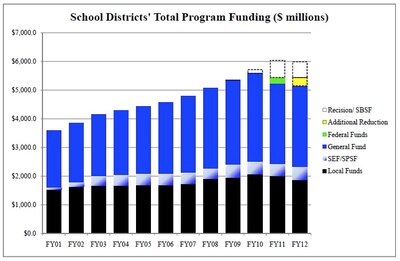Proposed school budget reductions next year may be the cuts that really damage the state’s education system, students, teachers, administrators and others told legislators Thursday.
The Senate Education Committee held a 3½ -hour hearing to take testimony from 40 witnesses on the effects of budget cuts expected in the 2011-12 school year.
Go straight to video highlights of the testimony.
Much of the testimony was familiar, with school board members, administrators and teachers telling of employees laid off, salaries frozen, furloughs imposed, purchases deferred and other savings squeezed out of district budgets.
But there was a tone that hasn’t been heard as much during budget debates in previous years – that the upcoming reductions will directly harm classroom instruction.
The session also surfaced some novel ideas about dealing with the problem – like using state funds to match local property tax increases in every state district, an idea floated by committee member Sen. Keith King, R-Colorado Springs and the administrator of a charter school.
And one witness, former State Board of Education member Randy DeHoff, argued that it’s “a mistake” to focus on funding alone. “Much of K-12 funding has little effect on the achievement of students” but is tied to state and federal requirements. “The better question is … given the level of funding available, how can that funding be used more effectively?”
DeHoff also argued that the current structure of public education is outmoded and will be disrupted by the rise of online learning. “We can lead that change or we can watch it, but it will take place.”
Here’s a sampling of the warnings voiced at the hearing:
- “This year it will affect the classroom. … We are looking at so many cuts I don’t know how much further we can go.” – Karen Stockley, Thompson board member
- “What is there left to give? Is education really a place where we can do more with less?” – Doreen Groene, Brighton teacher
- “We’ve kept our classrooms almost intact [but] there is not another $21 million in reductions we can make” without affecting classrooms. – Mary Chesley, Cherry Creek superintendent
- Cuts “are going to compromise the future of our kids.” – Kevin Schott, Basalt High School principal
- “We have no choice but to affect classrooms.” – Leslie Kiesler, Mesa board member
- “We’re unraveling something pretty remarkable that we’ve built.” – Don Haddad, St. Vrain superintendent
- “It’s hitting muscle” after four years of cuts. – Amanda Sheets, AFT-Colorado
Some witnesses echoed DeHoff in saying that state and federal mandates contribute to district financial problems.
“You shouldn’t have that many laws,” said former state Sen. Norma Anderson, holding up the thick book of state school laws.
Referring to a pending bill that specifies amounts of physical activity in elementary schools, Anderson asked, “Do you really need to?”
As for the CSAP tests, Anderson said, “Get rid of them. I carried the bill, but get rid of them.”
Haddad, referring to what he called “flawed ideological initiatives,” said, “There is a clear nexus between” reform initiatives and school costs.
“We have to have some mature conversation that recognizes that these things cost money.”
A mandates bill is pending in this year’s session, but its likely impact is narrow.
Several witnesses touched on the issue of conflicting fiscal provisions in the state constitution that have affected state and district revenues.
Lyndon Burnett, president of the Agate school board, said, “There is no cure short of constitutional reform.”
Margie Adams, board chair of Great Education Colorado, scolded legislators for failing to support a proposed school-funding referendum last year and for discouraging such efforts this year:
“We couldn’t do it last year; we’re told we can’t do it this year. In the meantime, the cuts build up and we’re losing another generation.”
While the hearing was intended for information gathering, King used it as platform to float some policy ideas, including his just-announced idea to reduce cuts through a combination of state funding and local property tax increases. King also is backing a plan to allow school districts to save money by reducing their contributions to employee pensions while increasing such payroll deductions for employees.
At the very end of hearing, when most of the crowd had left, King invited Jane Urschel of the Colorado Association of Schools Boards and Tony Salazar of the Colorado Education Association to the witness table to ask what they thought. Both were cool to the pension contributions swap, voicing concerns about its effect on the health of the Public Employees’ Retirement Association.

The hearing was prompted by the Hickenlooper administration’s proposed $332 million cut in K-12 total program funding. While the latest state revenue forecasts indicate it may be possible to reduce that amount somewhat, school spending is caught up with several other budget issues, including the size of the state reserve for next year.
Disagreement over those issues appears to have hung up completion of the 2011-12 budget bill by the Joint Budget Committee, which has a 3-3 partisan split.
Thursday’s hearing was promoted by committee chair Sen. Bob Bacon, D-Fort Collins, and by CEA, CASB and the Colorado Association of School Executives as a way of raising public awareness about the financial situation facing schools. The three groups organized several of the witnesses.
